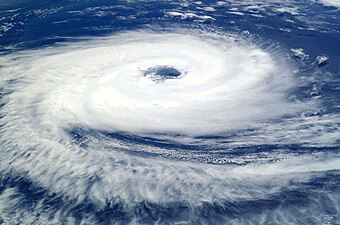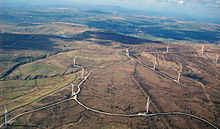Portal:Energy
| Main page | New articles & Tasks |
 The Energy Portal Welcome to Wikipedia's Energy portal, your gateway to energy. This portal is aimed at giving you access to all energy related topics in all of its forms.
|
Page contents: Selected article • Selected image • Selected biography • Did you know? • General images • Quotations • Related portals • Wikiprojects • Major topics • Categories • Help • Associated Wikimedia |
Introduction
In physics, energy (from Ancient Greek ἐνέργεια (enérgeia) 'activity') is the quantitative property that is transferred to a body or to a physical system, recognizable in the performance of work and in the form of heat and light. Energy is a conserved quantity—the law of conservation of energy states that energy can be converted in form, but not created or destroyed. The unit of measurement for energy in the International System of Units (SI) is the joule (J).
Common forms of energy include the kinetic energy of a moving object, the potential energy stored by an object (for instance due to its position in a field), the elastic energy stored in a solid object, chemical energy associated with chemical reactions, the radiant energy carried by electromagnetic radiation, and the internal energy contained within a thermodynamic system. All living organisms constantly take in and release energy.
Due to mass–energy equivalence, any object that has mass when stationary (called rest mass) also has an equivalent amount of energy whose form is called rest energy, and any additional energy (of any form) acquired by the object above that rest energy will increase the object's total mass just as it increases its total energy.
Human civilization requires energy to function, which it gets from energy resources such as fossil fuels, nuclear fuel, or renewable energy. The Earth's climate and ecosystems processes are driven by the energy the planet receives from the Sun (although a small amount is also contributed by geothermal energy). (Full article...)
Selected article
Scout Moor Wind Farm is the second largest onshore wind farm in England. The wind farm, which was built for Peel Wind Power Ltd, produces electricity from 26 Nordex N80 wind turbines. It has a total nameplate capacity of 65 MW of electricity, providing 154,000 MW·h per year; enough to serve the average needs of 40,000 homes. The site occupies 1,347 acres (545 ha) of open moorland between Edenfield, Rawtenstall and Rochdale, and is split between the Metropolitan Borough of Rochdale in northern Greater Manchester and the Borough of Rossendale in south-eastern Lancashire. The turbines are visible from as far away as south Manchester, 15–20 miles (24–32 km) away.
A protest group was formed to resist the proposed construction, and attracted support from the botanist and environmental campaigner David Bellamy. Despite the opposition, planning permission was granted in 2005 and construction began in 2007. Although work on the project was hampered by harsh weather, difficult terrain, and previous mining activity, the wind farm was officially opened on 25 September 2008 after "years of controversy", at a cost of £50 million. (Full article...)
Selected image

Photo credit: Johnson Space Center/NASA
Tropical cyclones feed on the heat released when moist air rises and the water vapor condenses.
Did you know?
- The Obninsk Nuclear Power Plant was the world's first civilian nuclear power plant while Sellafield (pictured) was the world's first commercial nuclear power station?
- The Chinese energy company Fushun Mining Group operates the largest oil shale plant in the world consisting 220 Fushun-type retorts?
- Three of the four largest power stations in the world are in South America?
- Adriatic LNG is the world's first offshore gravity-based structure LNG regasification terminal?
- The Horse Hollow Wind Energy Center is the world's largest wind farm at 735.5 megawatt?
- Scotland has 85% of the United Kingdom's hydro-electric energy resource?
- The day when Exxon canceled its Colony Shale Oil Project in Colorado is known by locals as "Black Sunday"?
- The Australian energy company Linc Energy is the first company in the world to produce synthetic fuel by combining underground coal gasification and gas-to-liquid technologies?
Selected biography
Born in Ireland, Thomson studied at the University of Glasgow, Scotland. On graduating, he became a mathematics teacher at the Royal Belfast Academical Institution. During his life Thomson published more than 600 scientific papers and filed over 70 patents.
As early as 1845 Thomson pointed out that the experimental results of William Snow Harris were in accordance with the laws of Coulomb. Over the period 1855 to 1867, Thomson collaborated with Peter Guthrie Tait the Treatise on Natural Philosophy that unified the various branches of physical science under the common principle of energy. His inventions included the current balance for the precise specification of the ampere, the standard unit of electric current.
In 1893, Thomson headed an international commission to decide on the design of the Niagara Falls power station. Despite his previous belief in the superiority of direct current electric power transmission, he agreed to use alternating current after seeing a Westinghouse demonstration at the Chicago World's Fair.
General images
The time allocated for running scripts has expired.
The time allocated for running scripts has expired. The time allocated for running scripts has expired.
The time allocated for running scripts has expired. The time allocated for running scripts has expired.
The time allocated for running scripts has expired.
WikiProjects connected with energy:
Other WikiProjects that may be of interest:
The time allocated for running scripts has expired.
The time allocated for running scripts has expired.
National energy supply, use & conservation
National electricity sector
Politics, economics, environment
- Climate change
- Energy conservation
- Energy economics
- Energy crises
- Energy development
- Energy policy
- Peak oil
Energy sources
- Fuels
- Biofuels
- Fossil fuels
- Fusion power
- Nuclear technology
- Renewable energy
- Energy conversion
- Electric power
- Energy storage
Energy-related design
Scientific usage
The time allocated for running scripts has expired.

Puzzled by energy?
Can't answer your question?
Don't understand the answer?
- Ask at the reference desk
- Read the Wikipedia help pages
For further ideas, to leave a comment, or to learn how you can help improve and update this portal, see the talk page.
The time allocated for running scripts has expired.
The following Wikimedia Foundation sister projects provide more on this subject:
-
Commons
Free media repository -
Wikibooks
Free textbooks and manuals -
Wikidata
Free knowledge base -
Wikinews
Free-content news -
Wikiquote
Collection of quotations -
Wikisource
Free-content library -
Wikiversity
Free learning tools -
Wiktionary
Dictionary and thesaurus




















































